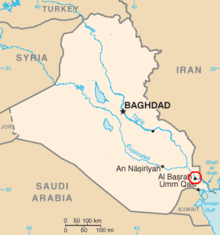Iraqi forces battle militants in Basra for second day
Thursday, March 27, 2008

On Wednesday, Iraqi security forces (ISF) battled militants who have been described as loyal to Shia cleric Muqtada al-Sadr in Basra, Iraq's main seaport and the country's third largest city. Reports indicate that at least sixty people have been killed and hundreds have been wounded. This marked the second day of intense fighting.
Combat is reported to have spread to other southern cities and also to Bagdhad. Agence France-Presse reported that two United States soldiers were killed in the capital city.
Prime Minister Nouri al-Maliki has been in Basra since Monday to personally supervise Operation Sulat al-Fursan (Knights Charge) which the authorities described as designed to reimpose law and order. Today, he gave an ultimatum to the militants, giving them 72 hours to surrender. "Otherwise, they will face the most severe penalties," Maliki said in a televised statement.
Observers see the Basra operation as a test of the Iraqi government's ability to assert its control over a region that is not administered by foreign military forces. United Kingdom forces patrolled Basra from the onset of the invasion until they turned it over to Iraqi authorities in December of 2007.
US spokesperson Major-General Kevin Bergner said that, "These are Iraqi decisions, they are Iraqi government forces and these are Iraqi leaders implementing and directing these decisions." He added that a year ago, the ISF would not have been able to conduct an operation of this scale.

Anthony Cordesman, a security analyst at the Center for Strategic and International Studies told Bloomberg via e-mail: "The current fighting is as much a power struggle for control of the south and the Shiite parts of Baghdad" as it is an attempt to establish government authority. The Supreme Islamic Iraqi Council is "clearly positioning itself for a power struggle with Sadr and for any elections to come," Cordesman added.
Bergner further said that the fighting in Basra is neither a battle against the Mahdi Army, nor is it a proxy war against Iran. Rather it is "to deal with criminals in the streets with weapons," he said. "We [the US] shall continue to show restraint on those who have undertaken Muqtada al-Sadr's pledge." A 2006 US report, however, called al-Sadr's Mahdi Army a "most dangerous accelerant of potentially self-sustaining sectarian violence in Iraq."
| We have been living for the last hours in hell ... We haven't seen anything like this since the foreign troops arrived in 2003 | ||
—Faris Hayder | ||
Aides of Muqtada al-Sadr say that the cleric's cease-fire, which was declared in August 2007, is still in force. On Tuesday, al-Sadr called for a non-violent "civil revolt" and supporters have been protesting the Maliki government forcing schools and shops to close.
"There are ongoing negotiations with the prime minister. Maliki asked to meet Sadr officials in Basra," Harith al-Ithari, head of al-Sadr's Basra office, told Reuters.
Muqtada al-Sadr was seen as instrumental in Maliki's rise to power, but al-Sadr broke from Maliki in 2005. According to Iraqi political analyst Hazem al-Nuaeimi, Sadr is a thorn in the side of other Shia groups that currently support Maliki. "There is a need to minimize the Sadrists' strength and influence and to draw the lines before they get any stronger," he said.
"We have been living for the last hours in hell. We have spent most of the time hiding under the staircase," said Faris Hayder, a 28-year-old resident of Basra to Reuters. "We haven't seen anything like this since the foreign troops arrived in 2003."
"No one wants to see a return to the violence of a year ago," Bergner said Wednesday on television from Baghdad. "This has been a difficult and challenging few days, it's also been a period of significant effort for the Iraqi security forces."
Sources
- Aref Mohammed. "Battles across Iraq's south in crackdown" — Reuters, March 26, 2008
- Robin Stringer. "Iraqi Forces Battle Sadr Militia in Baghdad, Basra" — Bloomberg L.P., March 26, 2008
- "Fresh clashes break out in Basra" — BBC News Online, March 26, 2008



